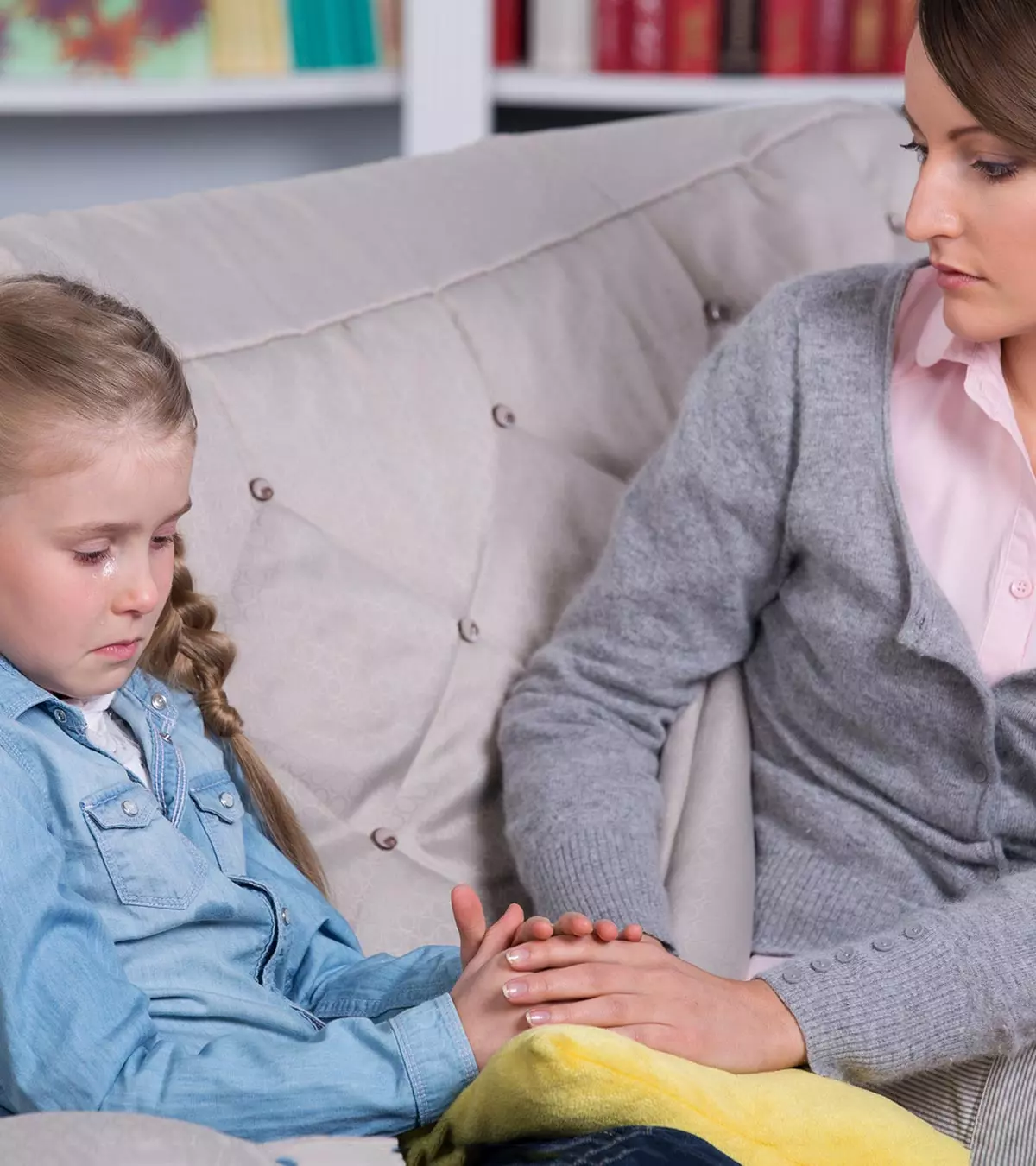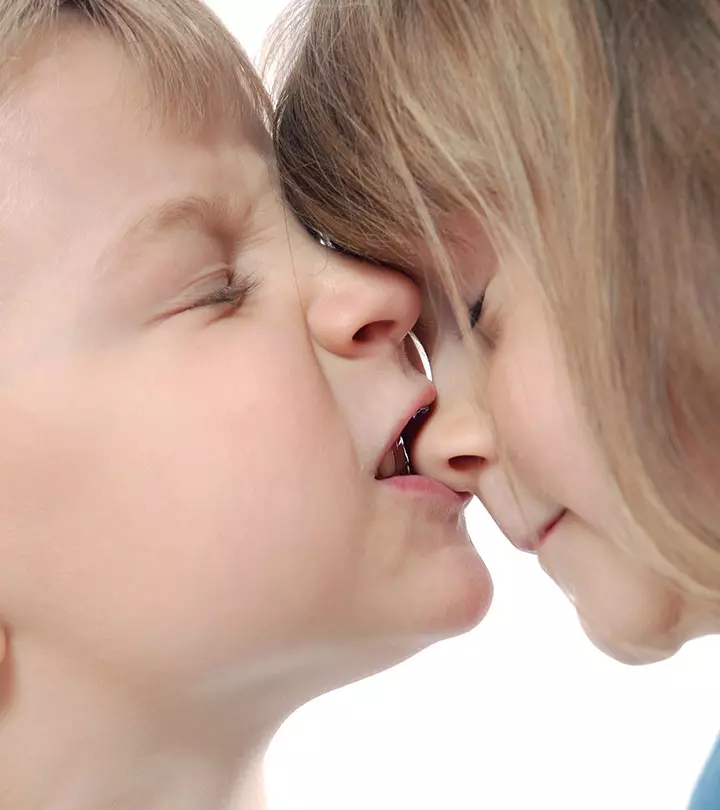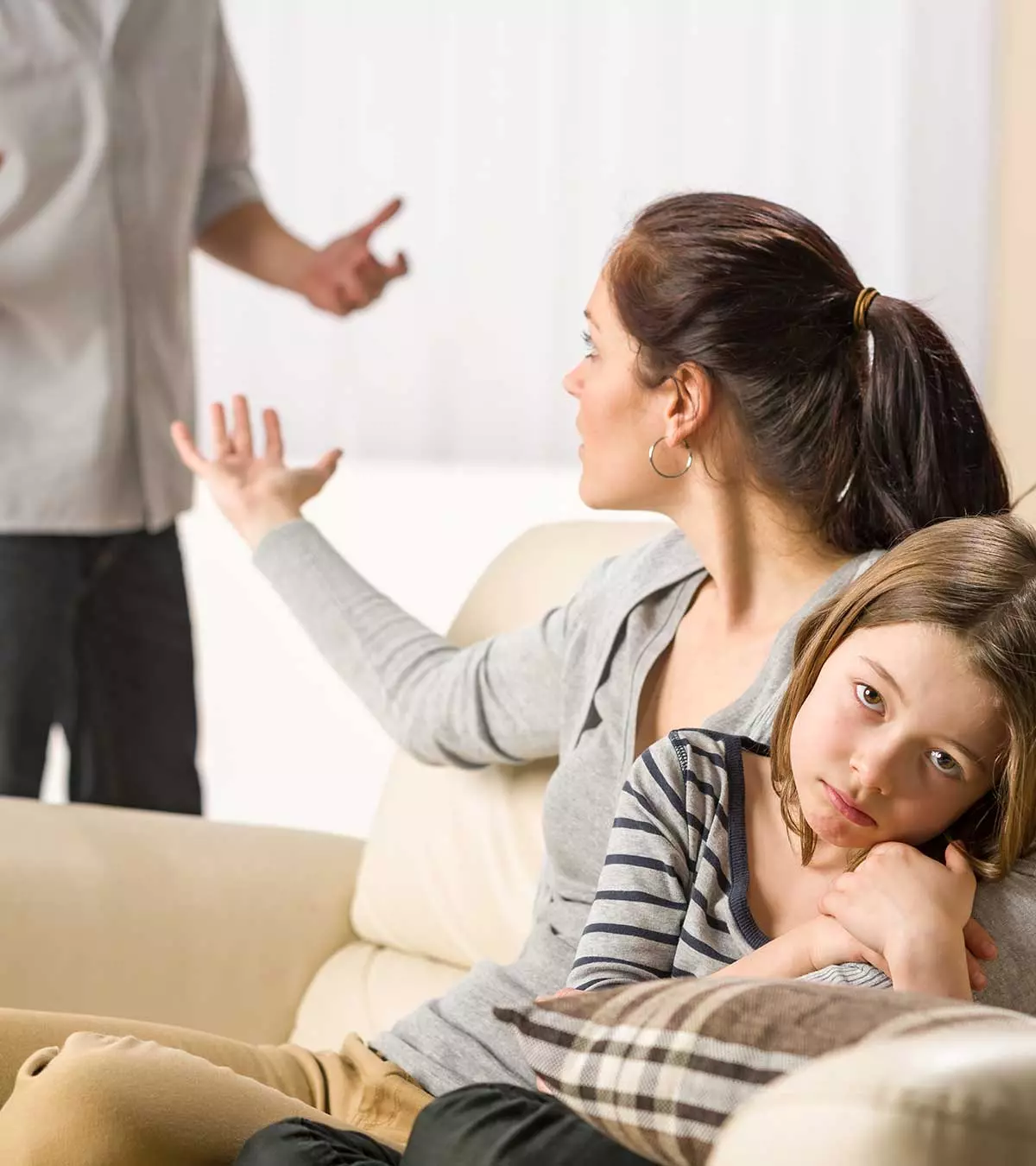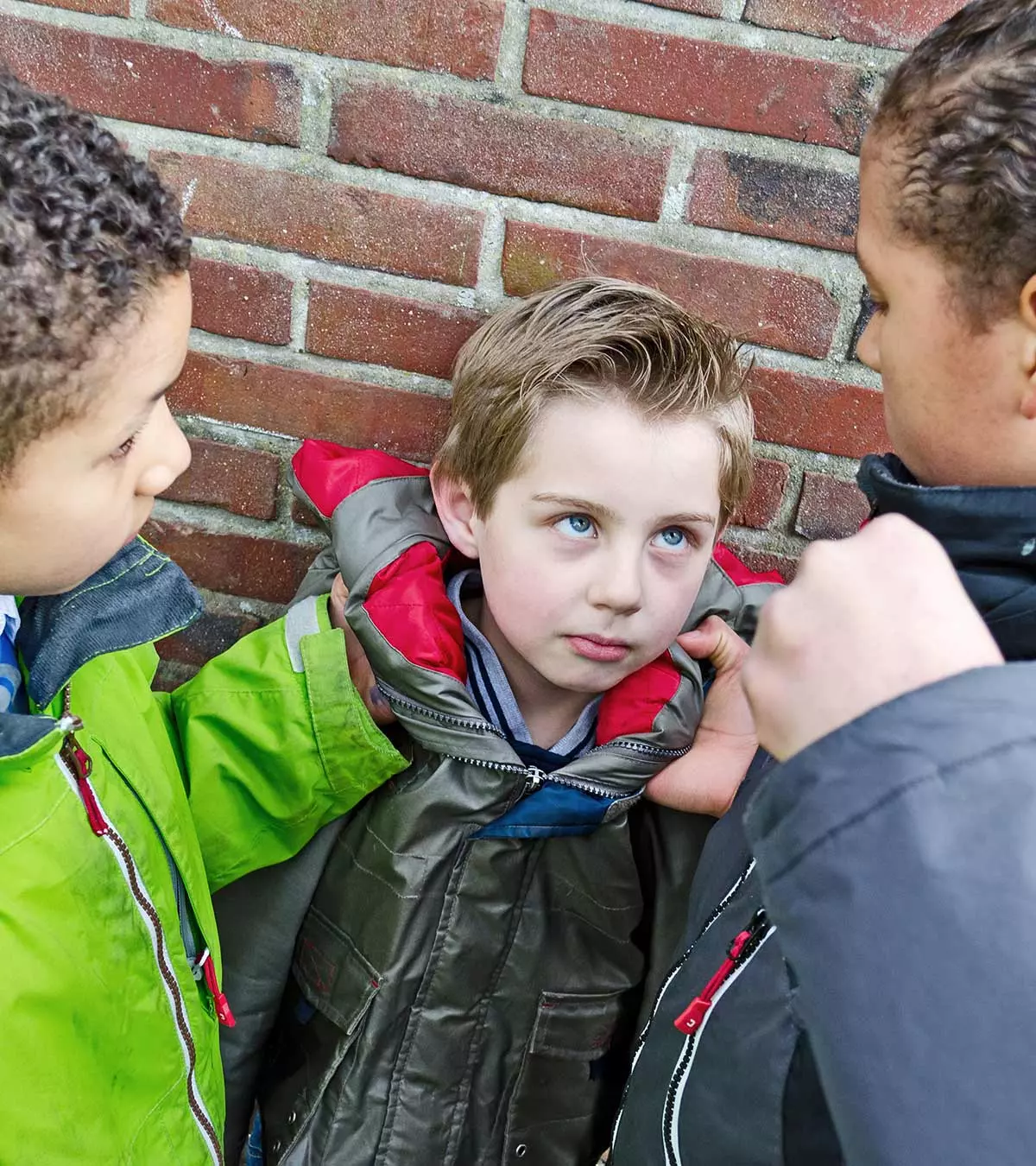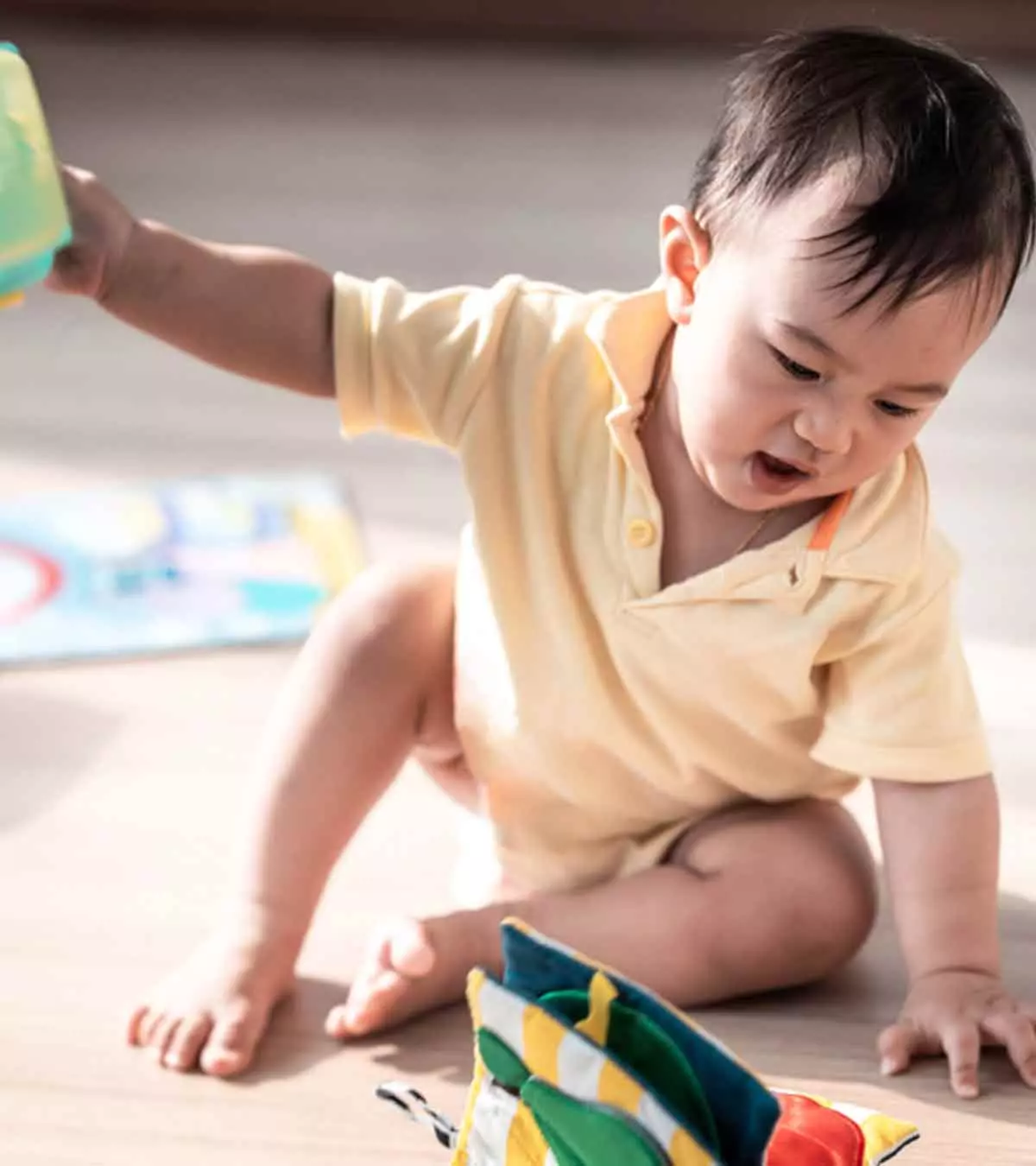
Image: Shutterstock
Toddlers throwing things is considered normal if this behavior does not become a pattern. Learning to throw is a developmental milestone that requires developed motor skills and good hand-eye coordination.

However, if you notice that your child throws things to gain attention, consider discussing it with a professional to detect any underlying issues. It is important to understand the reason behind a toddler’s behaviors, such as throwing things, to help them rectify them and inculcate better behaviors.
Read this post to understand what makes toddlers throw things and how you can help them manage this behavior.
Key Pointers
- Your toddler may throw things to get your attention, express emotions, or simply for fun.
- Throwing things may become a behavioral trait of your toddlers, leading them to become indisciplined and have destructive personalities.
- Establish home rules and teach your child about the consequences of their actions.
- Deal with your toddler’s behavior with patience, empathy, and persistence.
- Consult a pediatrician if your toddler is showing constant behavioral issues.
Why Do Toddlers Throw Things?
The simple act of throwing things could have several underlying reasons. A toddler may throw things for the following reasons (1) (2).
According to Maria Pistorio, LPC, NCC, a therapist specializing in EMDR, CBT therapy, and parent-child interaction therapy, “Toddlers often throw things instead of playing gently for many reasons. Sometimes, emotional dysregulation, which is in short supply for toddlers, leads to a tantrum. Other times, they throw things to learn what happens when they do it, both with the object and the relationship dynamics with the caregiver.”
- Exploration: Toddlers are filled with curiosity and learn through experimentation. Throwing things can be very interesting for them. They may do so to observe what happens when things bounce, fall, splash, or shatter. It is the toddler’s way of determining cause and effect. Observing the responses can help them understand their environment and the things around them, which helps a baby’s social development.
- Seek attention: Toddlers display attention-seeking behaviors, such as whiningiA persistent, high-pitched sound or cry and clingingiTendency to seek excessive closeness from a caregiver , to get attention from their favorite person. They will do numerous things to grab the limelight. Throwing things is one of the acts to grab your attention. If they observe it works, they will most likely repeat it. A toddler may usually use this trick when the parent or caregiver is occupied with work or is talking to someone else.
“Children crave attention, and it doesn’t matter if it is good or bad attention; they want it all. As a result, their behavior can be shaped with positive parental attention on positive opposite behaviors, such as praising the child for playing gently or keeping the toys on the table,” Pistorio adds.
- For fun: Toddlers get bored easily with similar games and the same toys during their playtime. Thus, they may try different ways of using the same objects or playing with the same toys. Throwing is one way of playing with an old toy or an object that the toddler now finds boring. Throwing becomes the new game, and if the toddler starts having fun with it, they are likely to repeat it.
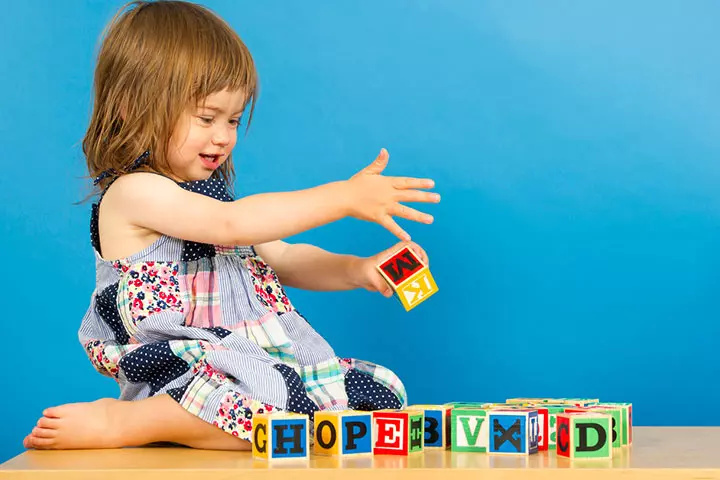
- Express emotions: Unlike adults, toddlers could find it difficult to express their feelings through words. Research suggests that toddlers aged three to five are most likely to experience temper tantrums, which usually last around 5 minutes (11). They usually communicate through actions, such as crying or throwing things. Throwing things could communicate anger, sadness, or frustration for some other underlying reason, such as pain or hunger.
Montessori guide and homeschooling parent Pilar B’s 14-month-old son used to throw almost everything that he could reach. Initially, it was difficult for her to understand the reason but gradually she figured it out. Pilar says, “I discovered that Zachary would throw when he was frustrated with a challenge but didn’t know how to ask for help; when he was tired but didn’t know how to tell me; and when he was done but didn’t know what to do about it. After much observation, it became clear that throwing was a way of communicating (i).”
 Quick fact
Quick fact- Incorrect use: The toddler may be too young to understand the correct use of objects and may throw them due to lack of comprehension. They might also do so because they have seen someone else do it. For instance, they could have seen an older child throw a ball, and later when the toddler is given any round object, they immediately throw it away.
- Love the sound: The toddler might just love to hear the sound the things make when they come in contact with the ground. And since every item makes a different noise when it hits the ground, this makes it all the more interesting for them.
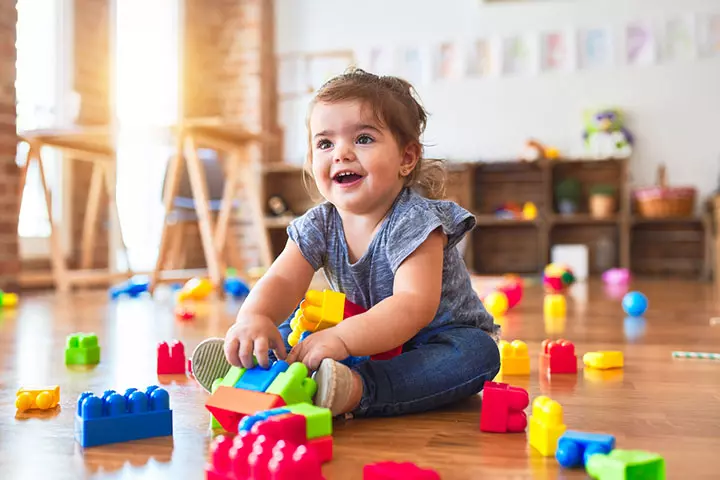
Problems That Might Arise Due To Toddler Throwing Things
If throwing becomes an ingrained habit, it may become a behavioral attribute. A toddler who becomes habituated to throwing things may develop the following undesired traits.
- The toddler may become indisciplined. If not stopped and corrected at the right moment, the toddler may repeat the behavior at any place and time, irrespective of whether it is appropriate. For example, a toddler who is habituated to throwing things may throw food and cutlery when at a restaurant.
- The toddler may develop a destructive personality. If inappropriate habits are not corrected, they could become an integral part of a child’s personality. The toddler would grow up to believe that it is okay to throw things to display anger or frustration. The habit may even carry forward to the toddler’s teenage years.
 Did you know?
Did you know?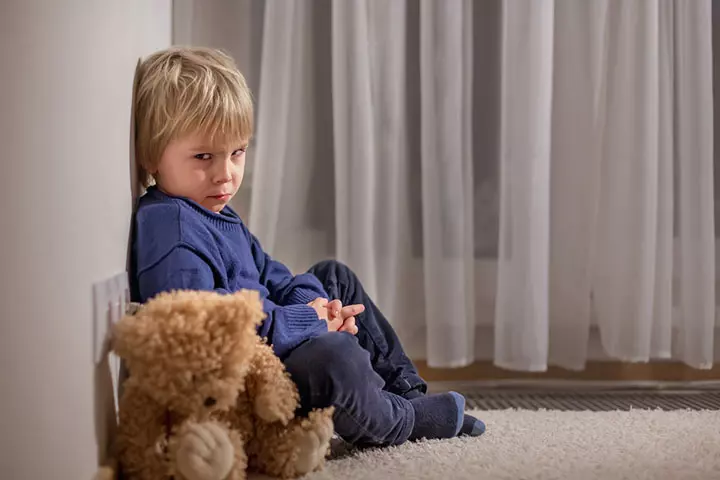
How To Stop Your Toddler From Throwing Things?
Parents must supervise and take necessary actions to prevent habits, such as throwing things, from becoming a character trait. You may consider trying the following interventions.
- Explain the consequences: Teach the toddler the cause and effect of throwing objects that are not meant to be thrown. For example, you could say, ‘If you throw your toy, it can break, and then you won’t be able to play with it anymore.’ Use simple language and a polite tone to convey how objects could break and not function correctly if thrown.
- Set rules and boundaries: Whenever the toddler throws a toy, take it away for some time. Set a rule that each time the toddler throws something, the object will be taken away. This technique will make the toddler realize that throwing things is unacceptable behavior.
 Quick tip
Quick tip- Give options: Provide alternatives when the child seems to have an urge to throw objects or when they want to experiment with cause and effect. This can be helpful for young toddlers who often throw objects out of curiosity (3). You could offer objects that are meant to be thrown, such as a ball or a Frisbee. This redirection will also help the toddler differentiate between objects that are meant to be thrown and those that are not allowed to be thrown.
- Praise them when they do right: Each time you see the toddler behaving as expected, praise them. If they are playing with a toy without throwing it, you can say, “It’s great that you are not throwing it anymore,” or “You are a good boy/girl who does not throw the toy but cares for it.” Praising good behavior encourages the child to repeat it (4). Pistorio suggests, “The behavior you pay attention to is the behavior you see more often, so paying attention to the positives proactively will reduce the incidence of the negative behaviors better than correcting the child. Tell the child what to do instead of what not to do.”
- Be a role model: Remember, your child is watching you! Toddlers learn by watching adults and try to copy them. If the toddler observes you throwing things when frustrated, they will be influenced to do the same. When they watch you stay calm during stressful situations, they are likely to imitate that behavior. If you want to change your child’s habits, you need to set the right examples through your actions.
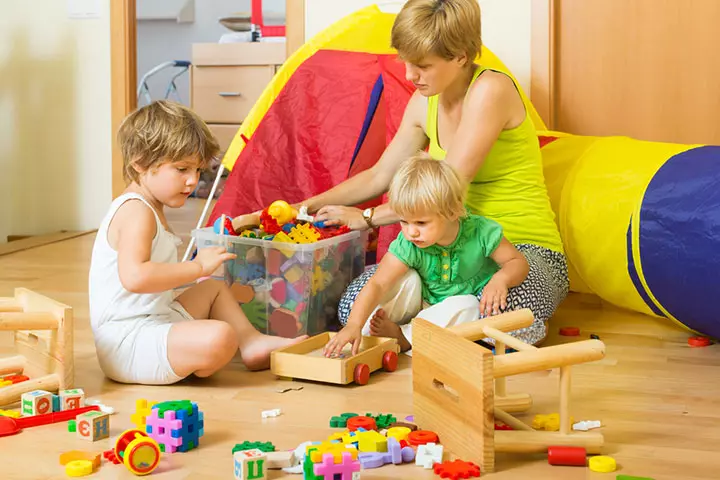
- Understand the child’s perspective: Some toddlers may have valid reasons for throwing objects, and it is essential to understand them. Observe when your toddler usually throws objects. For instance, a toddler may throw things when they are hungry or when it is past bedtime and they are not placed in their bed. Determine and address the underlying cause, and you can indirectly stop the toddler’s habit of throwing things.
- Teach constructive ways of expressing and exploring: When the toddler is in a good mood, teach them words and actions to express their emotions. Tell them that if they have a problem or are feeling sad or frustrated, they can always use positive communication methods to express their emotions instead of throwing things. Experts from the American Psychological Association recommend using calming, reassuring language to manage toddler temper tantrums, and incorporating phrases like, ‘If you are upset, so am I. Let’s take a few deep breaths to calm down and figure things out together (12).’
- Incorporate sensory play: Sensory play activities like playing with playdough, sand, or water can safely fulfill their urge to throw. By introducing tactile play, you can teach them what items are safe to throw, using different textures to enhance their sensory experience (5).
- Be calm and confident when reacting: A child will understand the language of love more than that of anger (6). Be calm as you address the child’s behavior. If you cannot control your anger at the very moment, take some quiet time, and speak to your toddler later. Excessive force and anger could prompt toddler tantrums at bedtime and throw objects more aggressively. Remember that tantrums are temporary. According to The American Academy of Pediatrics, tantrums are most common between ages 1 and 3 years and are a normal part of the child’s development. Tantrums fade out as the toddler grows (13).
- Tidy up together: Clean up the mess created by your toddler together. It could help the toddler see the damage, which they may not see in the heat of throwing things. Show the child how throwing things can damage them, and one can never have them back again. Let your toddler sense the extent of damage by not replacing anything they throw and break.
- Teach table manners: If your toddler has a habit of throwing food, teach them good table manners and let them know the importance of table manners for kids. You can do so by involving the entire family during meal times. Teach your toddler the importance of eating slowly without throwing the food around. Some toddlers tend to fling food when they are full. Acquaint your toddler with polite words or gestures they could use to communicate they are full instead of throwing food to kill time at the dining table.

- Seek support from reliable sources: Talk to a pediatrician if your child’s behavior seems linked to health or behavioral issues. Joining support groups can provide helpful insights and experiences.
Patience, empathy, and consistency are what you need to break or make a habit in children. Make sure you reinforce appropriate behavior through the regular practice of the above-mentioned interventions.
When To See A Doctor?
You may consult a doctor about your toddler’s behavior if the toddler (7):
- Throws objects without any discernible triggers or reasons.
- Always ignores “No” or other instructions while throwing objects.
- Prefers throwing objects even in situations where they can communicate with you easily.
- Shows intense anger or frustration each time they throw things.
- Mostly throws objects directed towards someone, such as a parent or a sibling.
- Does not respond to your consistent efforts of correcting the habit.
Consult the pediatrician for such behavioral patterns. In some cases, these might be signs of autismiA developmental disability leading to issues with social communication and interaction or repetitive behavior , although you should not make any conclusions (8). Your toddler will undergo several tests to conclude the presence of autism, but only if the healthcare provider suspects it. If you are unsure about handling your toddler, consult a pediatrician, even if there are no signs of autism. They can offer personalized strategies to help manage your toddler’s throwing behavior.
Frequently Asked Questions
1. Do toddlers with autism throw things?
Throwing objects to express emotions such as anger and anxiety (temper tantrums) is common among toddlers. However, toddlers with autism may engage in this activity more since they experience greater difficulty understanding, managing, and expressing their emotions (9). Parents can help toddlers with autism improve their behavior with patience and persistence.
2. Do toddlers with ADHD throw things?
Toddlers with ADHDiA neurodevelopmental disorder affecting the child's ability to pay attention, control impulses, and manage energy levels are impulsive and may find practicing self-control difficult (10). When overstimulated, they may express their emotions by throwing objects. However, most toddlers throw things for fun or to express their emotions. Thus, a toddler who throws objects doesn’t necessarily have ADHD. If you are worried about your toddler’s behavior, speaking to a doctor can help end your doubts and speculations.
3. What can I do if my toddler’s throwing behavior is causing harm to others or damaging property?
If your toddler is showing destructive behavior, tell them that this behavior is unacceptable and will have consequences. Effective toddler discipline is important to encourage good behavior. Then, have them take responsibility for their action by apologizing and cleaning up the mess. You should also follow up with an appropriate punishment, such as involving them in chores and limiting playtime. Additionally, to prevent future incidents, keep valuable objects from your toddler’s reach, divert their attention when you notice the anger building up, and consult a professional.
4. How can I differentiate between normal throwing and problematic behavior?
If your toddler is throwing things during playtime or mealtimes, this behavior could be normal and a part of their exploration and development. However, if you notice your toddler throwing things frequently and they seem aggressive without any reason, it may indicate problematic behavior.
5. What activities can distract my toddler from throwing?
Activities like sensory play, throwing games, building blocks, and outdoor play can help toddlers’ throwing habits as these activities encourage exploration under elders’ guidance and with the correct objects and setting.
Toddler throwing things is a bothersome but benign habit that wanes once the toddler understands objects and surroundings better. Learning through experimentation, seeking attention, and expressing themselves are common reasons for toddlers throwing objects. But since throwing objects can sometimes hurt the baby or others, you must adopt positive discipline strategies to teach your defiant toddler the right ways to vent out frustration. If they like throwing things for fun, provide them with safer alternatives like soft toys so that they may not hurt themselves and others.
Infographic: Toddler Throwing Things: Behavior Management Strategies
Toddlerhood comes with new challenges for parents, including the toddler’s temper tantrums and throwing things at hand. If you have a toddler who often resorts to such behaviors, you may try the strategies described in this infographic to help your child learn positive behaviors.
Some thing wrong with infographic shortcode. please verify shortcode syntax
Learn effective techniques to prevent your toddler from hurling objects through this informative video! Gain valuable insights on redirecting their actions and ensuring their safety.
Personal Experience: Source
MomJunction articles include first-hand experiences to provide you with better insights through real-life narratives. Here are the sources of personal accounts referenced in this article.
i. Montessori Children Don’t Throw;https://thefullmontessori.wordpress.com/2014/10/20/montessori-children-dont-throw/
References
- Learn the Signs Act Early; CDC
https://www.cdc.gov/ncbddd/actearly/milestones/milestones-1yr.html - When Toddlers Throw Things; From The Beginning
http://www.beginning.org/DiaperNet/DiQa/DiQAs35.html - Interrupt and Redirect: For Toddler Throwing; Watson Institute
https://www.thewatsoninstitute.org/watson-life-resources/situation/interrupt-redirect-toddler-throwing/ - Aggressive Behavior In Toddlers; Zero To Three
https://www.zerotothree.org/resource/aggressive-behavior-in-toddlers - What Is Sensory Play? The Benefits for Your Child and Sensory Play Ideas.
https://health.clevelandclinic.org/benefits-of-sensory-play-ideas - What Not To Do When Your Child Is Having a Tantrum; Child Mind Institute
https://childmind.org/article/what-not-to-do-when-your-child-is-having-a-tantrum/ - Preschooler With Autism Won’t Stop Throwing Things When Upset; Autism Speaks
https://www.autismspeaks.org/expert-opinion/throwing-toys-autism - Early Warning Signs Of Autism Spectrum Disorder; CDC
https://www.cdc.gov/ncbddd/actearly/autism/curriculum/documents/early-warning-signs-autism_508.pdf - Autism and Tantrums: Behavioral Strategies for Parents; Therapeutic Pathways
https://www.bluesprigautism.com/blog/tips-for-managing-tantrums-for-your-child-with-autism/ - ADHD in Children; Help Guide
https://www.helpguide.org/mental-health/adhd/adhd-in-children - Alithe L Van den akker et al. (2025);, Temper Tantrums in Toddlers and Preschoolers: Longitudinal Associations with Adjustment Problems.
https://pmc.ncbi.nlm.nih.gov/articles/PMC9462137/ - Here’s advice from psychologists on how to help kids cope with anger and frustration.
https://www.apa.org/topics/parenting/managing-preschool-aggression - Top Tips for Surviving Tantrums.
https://www.healthychildren.org/English/family-life/family-dynamics/communication-discipline/Pages/Temper-Tantrums.aspx
Community Experiences
Join the conversation and become a part of our nurturing community! Share your stories, experiences, and insights to connect with fellow parents.
Read full bio of Dr. Richard Mario Lurshay
- Maria Pistorio specializes in EMDR, Cognitive Behavioral Therapy (CBT), and Parent-Child Interaction Therapy (PCIT). She sees clients in Pennsylvania at her office and in Pennsylvania and Florida via telehealth. Maria is a Licensed Professional Counselor (LPC), Nationally Certified Counselor (NCC), certified in PCIT, and certified in CBT by the Philadelphia College of Osteopathic Medicine.
 Maria Pistorio specializes in EMDR, Cognitive Behavioral Therapy (CBT), and Parent-Child Interaction Therapy (PCIT). She sees clients in Pennsylvania at her office and in Pennsylvania and Florida via telehealth. Maria is a Licensed Professional Counselor (LPC), Nationally Certified Counselor (NCC), certified in PCIT, and certified in CBT by the Philadelphia College of Osteopathic Medicine.
Maria Pistorio specializes in EMDR, Cognitive Behavioral Therapy (CBT), and Parent-Child Interaction Therapy (PCIT). She sees clients in Pennsylvania at her office and in Pennsylvania and Florida via telehealth. Maria is a Licensed Professional Counselor (LPC), Nationally Certified Counselor (NCC), certified in PCIT, and certified in CBT by the Philadelphia College of Osteopathic Medicine.
Read full bio of Rohit Garoo
Read full bio of Dr. Ritika Shah
Read full bio of Apoorva K






